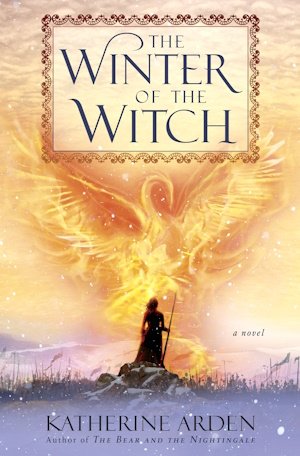“Stay near at least?” she said.
“Of course I’ll stay.”
She nodded once, eyelids already heavy. Sasha, studying her, surprised himself by saying, “You look just like our mother.”
Her eyes opened at that; sudden pleasure drove away the shadows in her face. He said, smiling, “Our mother always put bread in the oven at night. For the domovoi.”
“I did the same,” said Vasya. “When I lived at Lesnaya Zemlya.”
“Father teased her for it. He was always content, in those days.
They—they loved each other very much.”
Vasya was sitting up now. “Dunya did not speak much of her. Not when I was old enough to remember. I think—I think Anna Ivanovna forbade it. For our father did not love her, and he had loved our mother.”
“They were a joy to each other,” said Sasha. “Even as a boy, I could see it.”
It was hard to speak of that time. He had ridden away the year after his mother died. Would he have stayed, if she had lived? He didn’t know. Ever since he came to the Lavra, he had tried to forget the boy he had been: Aleksandr Petrovich, with his faith and his strength, his enthusiasms and foolish pride. The boy who had worshipped his mother.
But now he found himself remembering. He found himself talking.
To his sister, he spoke of Midwinter feasts, and childhood mishaps, of his first sword, his first horse, his mother’s voice raised laughing in the forest ahead of him. He spoke of her hands, her songs, her offerings.
Then he spoke of the Lavra in winter, the deep calm of the monastery, the bell ringing out over the dreaming forest, the slow round of prayers that marked the cold days, the steady faith of his
master, whom men came to see from many days’ travel in all directions. He spoke of the days on horseback, and the nights around his fire; he spoke of Sarai and Moscow and places in between.
He spoke of Russia. Not of Muscovy, or Tver, or Vladimir, the principalities of the sons of Kiev, but of Russia itself, of its skies and its soil, its people and its pride.
She listened in rapt stillness, eyes vast and filled like cups with shadow. “That is what we are fighting for,” said Sasha. “Not for Moscow, or even Dmitrii; not for the sake of any of her squabbling princes. But for the land that bore us; man and devil alike.”
33.
On the Cusp of Winter
VASYA AWAKENED TO THE TOUCH of early snow on her face.
Sasha had fallen asleep at last, the murmur of his prayers stilled, in the deep hush of night. The air had a crisp bite; the earth was just rimed with frost. The men’s voices all around had sunk to silence. All who could sleep were sleeping, to gather strength against the dawn.
A chill wind raced through the Russian camp, fluttering their banners, and sending snow in eddies over the earth.
Vasya took a deep breath and got to her feet, pausing to lay the cloak over her sleeping brother. She saw the Bear. He was in the form of a man, standing perfectly still, beyond the red coals of their fire. He was watching the scanty flakes drift down from the sky.
“It is early for snow,” said Vasya.
For the first time, there was a hint of fear beneath the exalted malice in the Bear’s face. “It is my brother’s power waxing,” he said.
“One more test, sea-maiden. And it might be the hardest.”
Vasya straightened her back.
The winter-king rode out of the dark, as though the cold wind had blown him to her, his mare’s hooves soundless against the muddy, white-glazed earth.
The two armies, even her sleeping brother, might not have existed.
There was only herself, the king of chaos, and the king of winter, wrapped in a whirl of new snow. Morozko was not the thin, almost formless creature of high summer, nor was he the magnificent velvet-clad lord of midwinter. He was dressed all in white; the first bitter breath of the new season.
He halted and slid from the back of his horse.
Her throat was dry. “Winter-king,” she said.
He surveyed her, up and down. He did not look at the Bear, but his not-looking had a force all its own. “I knew you meant to fight, Vasilisa Petrovna,” he said, after a moment. “I didn’t know the manner you would choose.”
Only then did his glance find his brother. A spark of old hatred leaped between them. “You were always insufferable, Karachun,”
said the Bear. “What did you think would happen, when you left her to fight a war she had no notion how to win?”
“I thought you had learned some wisdom,” said Morozko, turning back to Vasya. “You have seen what he is capable of.”
“You knew what he was capable of, better than I,” said Vasya. “Yet you also freed the Bear because you were desperate. I was desperate too. Just as he swore you an oath then, he has sworn one to me now.”
She raised her hands. The two ropes glowed at her wrists, power quiescent in the oily gold. “Has he?” said Morozko, with a cold glance at them. “And after he swore? What then? Have you been roving about, terrorizing men in his company? Have you gotten a taste for cruelty?”
“Do you not know me?” she said. “I have loved danger since I was a child. But I have never loved cruelty.”
Morozko’s eyes searched her face, searched and searched until she looked away, getting angry. He snapped, “Look at me!”
She snapped back, “What are you looking for?”

























